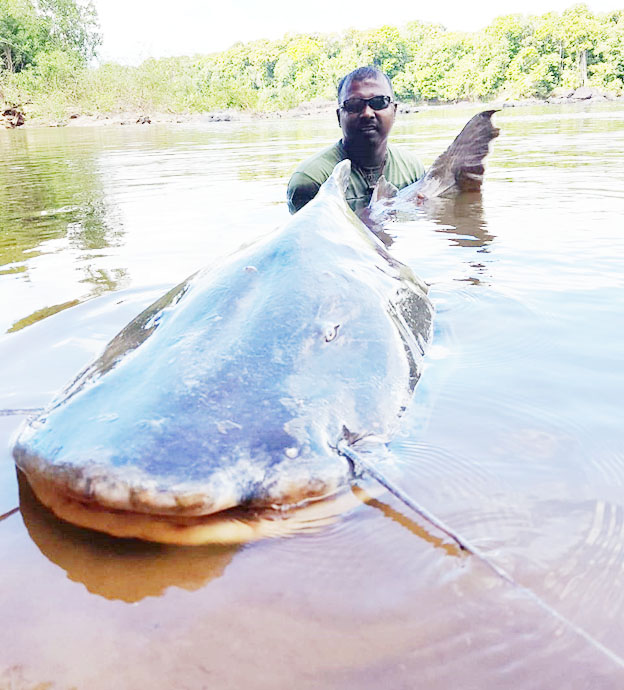The Rupununi Ranchers Rodeo appeared to have lifted Lakeram Ropnarain’s spirits. These days, the Rodeo has that kind of effect on the modest Lethem business community. It has the effect of infusing a generous even if temporary spurt of commercial activity into an economy that ebbs and flows with the fluctuating fortunes of gold. The Rodeo and the demand for services of one sort or another by the people who had travelled to Lethem for the event two weeks ago, meant that Lakeram could anticipate some measure of respite from the challenging times.
His is a multi-sectorial business enterprise the centrepiece of which is a 30-room hotel, the Hotel Toucana. When we spoke it was filled to capacity and he could, as well, rely on patronage of the restaurant and bar. He wishes there could be a Rodeo every weekend. In the absence of that kind of activity the Hotel becomes a troubled enterprise, kept afloat by two other enterprises that he owns, Adventure Guianas, which offers tours to the interior regions of Guyana and to neighbouring countries and the Piraiba Lodge, eighteen miles south Kurupukari in the Essequibo river. These fortunately, hold their own even in these difficult times.
Prior to ten years ago Lakeram was residing in Better Hope on the East Coast Demerara. In 1998 he had commenced doing an administrative job with the National Parks Commission. His list of responsibilities took him
to places like the Kaieteur National Park and the Iwokrama Rainforest Project. It was the knowledge base that he built through hinterland travel that set him thinking in the direction of a business venture that capitalized on his experiences.
He had established Adventure Guianas in 2008 and that had served as a kind of launch pad for the various other enterprises into which he subsequently ventured. His visits to hinterland regions also took him to the Iwokrama Rainforest facility.
Other enterprises followed – like a minibus transportation service between Georgetown and Lethem and a service that offers fishing ‘outings’ in the Essequibo River.
Himself an avid fisherman, his fishing outings had developed out of an approach which he had received from a group of British visitors to Guyana. Later on, he was to learn just how popular sport fishing is in Europe and elsewhere.
These days, Lakeram is a bona fide Lethem businessman, administering a clutch of businesses which he says is worth in excess of $100 million. His wife and two children reside there with him and during the Rodeo weekend he appeared ‘at home’ in his adopted environment.
Interior businessmen invariably provide enlightening perspectives on the nature of the economic climate in which they operate. Lakeram, like the others, talks about the nexus between the gold mining industry and the Lethem economy. The Linden/Lethem road, too, is a permanent preoccupation with businessman. For much of the time between May and August the road throws up challenges that frequently disfigures the Lethem economy, making life tough, some barely bearable. The movement of goods to Lethem is hindered and there are consequential price rises. The roads, meanwhile, exact their own toll on the buses that ply the route.
There are initiatives, Lakeram says, that might help to turn things around – like the Rupununi Expo that affords the producers from the various villages an opportunity to display their goods at Lethem and to have access to short-term markets. There is, as well, the Rupununi Music Festival. Both of these events, almost certainly on account of a lack of adequate marketing, have been unable to attract any meaningful patronage from outside of the region. Neither of these events, Lakeram says has grown even though their growth can create a great many new economic opportunities for the people of those communities. Domestic tourism, Lakeram believes, could be one of the keys to unlocking the economic fortunes of the interior. He concedes, however, not only that the necessary supporting infrastructure is either weak or non-existent but that, on the whole, Guyanese do not have that voracious appetite for traveling in their own country as is the case elsewhere. It is, in part, a matter of the high cost of domestic tourism though it goes beyond that.
Lakeram believes that one possible way of creating an enhanced visitor interest in interior locations – apart from developing the infrastructure to encourage greater numbers of Guyanese to indulge in ‘inward’ tourism – is to reach out to our neighbours, particularly Brazil. Noting that the Rupununi Rodeo has already attracted the attention of modest numbers of Brazilians, Lakeram says that a deliberate and sustained initiative to raise the profile of indigenous festivals and other events linked to a simultaneous promotion of these events among target audiences in neighbouring Brazil could eventually become a significance game-changer for hinterland tourism. A starting point for this initiative could well be the Rupununi Expo which takes place in November and the Rupununi Music and Arts Festival which, following a beginning in February 2015, appears to have fallen by the wayside.





